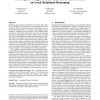Free Online Productivity Tools
i2Speak
i2Symbol
i2OCR
iTex2Img
iWeb2Print
iWeb2Shot
i2Type
iPdf2Split
iPdf2Merge
i2Bopomofo
i2Arabic
i2Style
i2Image
i2PDF
iLatex2Rtf
Sci2ools
115
click to vote
ICFP
2010
ACM
2010
ACM
The impact of higher-order state and control effects on local relational reasoning
Reasoning about program equivalence is one of the oldest problems in semantics. In recent years, useful techniques have been developed, based on bisimulations and logical relations, for reasoning about equivalence in the setting of increasingly realistic languages--languages nearly as complex as ML or Haskell. Much of the recent work in this direction has considered the interesting representation independence principles enabled by the use of local state, but it is also important to understand the principles that powerful features like higher-order state and control effects disable. This latter topic has been broached extensively within the framework of game semantics, resulting in what Abramsky dubbed the c cube": fully abstract game-semantic characterizations of various axes in the design space of ML-like languages. But when it comes to reasoning about many actual examples, game semantics does not yet supply a useful technique for proving equivalences. In this paper, we marry th...
| Added | 09 Nov 2010 |
| Updated | 09 Nov 2010 |
| Type | Conference |
| Year | 2010 |
| Where | ICFP |
| Authors | Derek Dreyer, Georg Neis, Lars Birkedal |
Comments (0)

